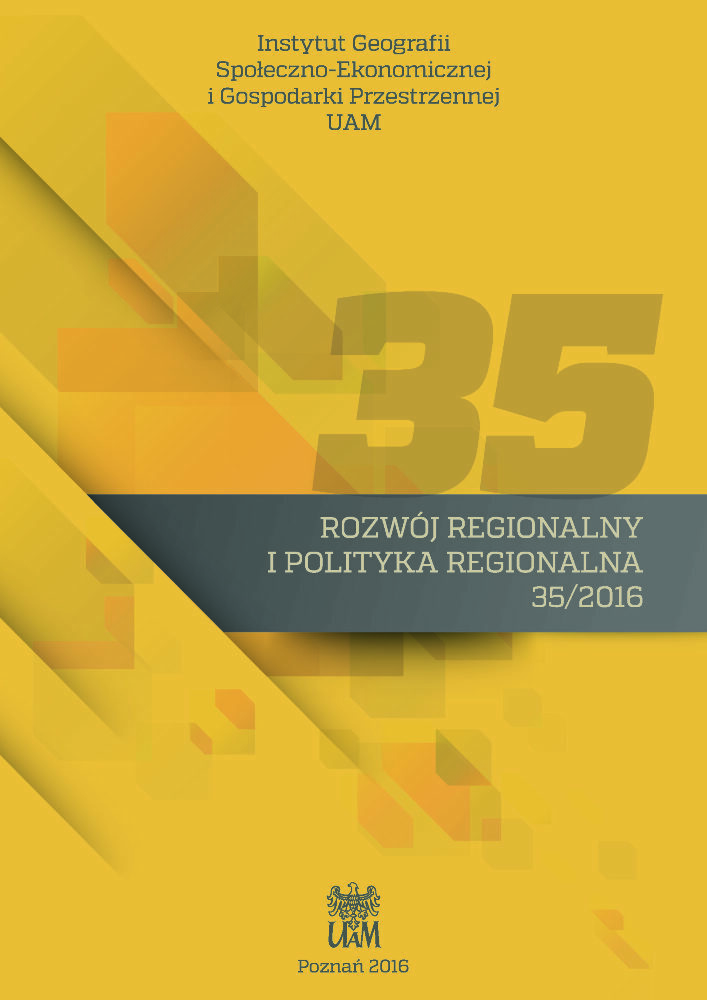Abstrakt
Despite many novelties in participation: participatory budgeting, citizens jury, deliberatice poll etc. the engagement of different stakeholders’ groups in the decision making processes concerning detailed planning issues (local spatial management plans, water management plans, the preservation management plans of the Natura 2000 sites) is usually based on the organization of open discussion meetings. The study looks at the social consultations regarding acceptance of local spatial management plans managed by Poznań City Hall and consultations concerning the preparation of water management plans managed by Regional Water Management Board in Poznań. The comparative analysis served to exhibit similarities and differences between the processes in terms of legal conditions, the organization of meetings, the length and the scale of the process and the actors engaged.Bibliografia
Abelson J., Forest P-G., Eyles J., Smith P., Martin E., Gauvin F.-P. 2003. Deliberations about deliberative methods: issues in the design and evaluation of public participation processes. Smaocial Science & Medicine, 57(2): 239–251. DOI: https://doi.org/10.1016/S0277-9536(02)00343-X
Arnstein S. A ladder of citizen participation. 1969. Journal of the American Institute of Planners, 35(4): 216–224. DOI: https://doi.org/10.1080/01944366908977225
Buchy M., Hoverman S. 2000. Understanding public participation in forest planning: a review. Forest Policy and Economics, 1(1): 15–25. DOI: https://doi.org/10.1016/S1389-9341(00)00006-X
Bugs G., Granell C., Fonts O., Huerta J., Painho M. 2010. An assessment of Public Participation GIS and Web 2.0 technologies in urban planning practice in Canela, Brazil. Cities, 27:172–181. DOI: https://doi.org/10.1016/j.cities.2009.11.008
Carr G., Blöschl G., Loucks D. P.2012. Evaluating participation in water resource management: A review. Water Resources Research, 48, W11401, doi:10.1029/2011WR011662. DOI: https://doi.org/10.1029/2011WR011662
Chess C., Purcell K. 1999. Public Participation and the Environment: Do We Know What Works. Environmental Science and Technology, 16:2685–2692. DOI: https://doi.org/10.1021/es980500g
Few R., Brown K., Tompkins E. 2007. Public participation and climate change adaptation: avoiding the illusion of inclusion. Climate Policy, 7(1): 46–59. DOI: https://doi.org/10.1080/14693062.2007.9685637
Fung A. 2006. Varieties of Participation in Complex Governance. Public Administration Review, 66: 66–75. DOI: https://doi.org/10.1111/j.1540-6210.2006.00667.x
Hjortsø C. N. 2004. Enhancing public participation in natural resource management using Soft OR––an application of strategic option development and analysis in tactical forest planning. European Journal of Operational Research, 152(3): 667–683. DOI: https://doi.org/10.1016/S0377-2217(03)00065-1
Innes J.E., Booher D.E. 2004. Reframing Public Participation: Strategies for the 21st Century. Planning Theory and Practice, 5(4): 419–436. DOI: https://doi.org/10.1080/1464935042000293170
Jager N., Challies E., Kochskämper E., Newig J., Benson D., Blackstock K., Collins K., Ernst A., Evers M., Feichtinger J., Fritsch O., Gooch G., Grund W., Hedelin B., Hernández-Mora N., Hüesker F., Huitema D., Irvine K., Klinke A., Lange L., Loupsans D., Lubell M., Maganda C., Matczak P., Páres M., Saarikoski H., Slavíková L., Van Der Arend S., Von Korff Y. 2016. Transforming European Water Governance? EU Water Framework Directive implementation in 13 member states. Water, 156(8); doi:10.3390/w8040156 DOI: https://doi.org/10.3390/w8040156
Jones-Walters L., Aysegül Ç. 2011. Biodiversity and stakeholder participation. Journal for Nature Conservation 19(6): 327–329. DOI: https://doi.org/10.1016/j.jnc.2011.09.001
Kaczmarek T., Wójcicki M. 2015. Uspołecznienie procesu planowania przestrzennego na przykładzie miasta Poznania. Ruch Prawniczy, Ekonomiczny i Socjologiczny, 77(1): 219–236. DOI: https://doi.org/10.14746/rpeis.2015.77.1.12
King C., Feltey K.M., O’Neill Susel B. 1998. The Question of Participation: Toward Authentic Public Participation in Public Administration. Public Administration Review. 58( 4): 317-326. DOI: https://doi.org/10.2307/977561
Kowalczak P., Matczak P., Slavikova L. 2013. Institutional evolution in water management in the Czech Republic and Poland, International Journal of Water Governance, 1: 307–322, doi: 10.7564/13-IJWG8 DOI: https://doi.org/10.7564/13-IJWG8
Miller-Rushing A., Primack R., Bonney R. 2012. The history of public participation in ecological research. Frontiers in Ecology and the Environment. 10(6): 285–290, doi:10.1890/110278 DOI: https://doi.org/10.1890/110278
Mould O. 2014. Tactical Urbanism: The New Vernacular of the Creative City, Geography Compass, 8/8: 529–539, 10.1111/gec3.12146 DOI: https://doi.org/10.1111/gec3.12146
Newig J. 2007. Does public participation in environmental decisions lead to improved environmental quality. Communication, Cooperation, Participation. Research and Practice for a Sustainable Future, 1: 51–71.
Newig J., Oliver F. 2009. Environmental governance: participatory, multi-level – and effective? Environmental Policy and Governance 19: 197–214. DOI: https://doi.org/10.1002/eet.509
Olech A. 2012. Modele partycypacji publicznej w Polsce In: A. Olech (ed.) Dyktat czy uczestnictwo? Diagnoza partycypacji publicznej w Polsce. Instytut Spraw Publicznych, Warszawa, Tom I: 25–53.
Rowe G., Frewer L.J. 2005. A typology of public engagement mechanisms. Science, Technology & Human Values. 20(3): 251–290. DOI: https://doi.org/10.1177/0162243904271724
Sieber R.E., Robinson P.J., Johnson P.A., Corbett J.M. 2016. Doing public participation on the geospatial web. Annals of the American Association of Geographers, 106(5): 1030–1046, doi: 10.1080/24694452.2016.1191325. DOI: https://doi.org/10.1080/24694452.2016.1191325
World Bank 1996. The World Bank Participation Sourcebook, Washington D.C.
World Bank 1995. Guidelines for Using Social Assessment to Support Public Involvement in World Bank GEF Projects, Washington D. C.
Licencja
Copyright
© 2016 IGSEiGP, Uniwersytet im. Adama Mickiewicza w Poznaniu
OPEN ACCESS
